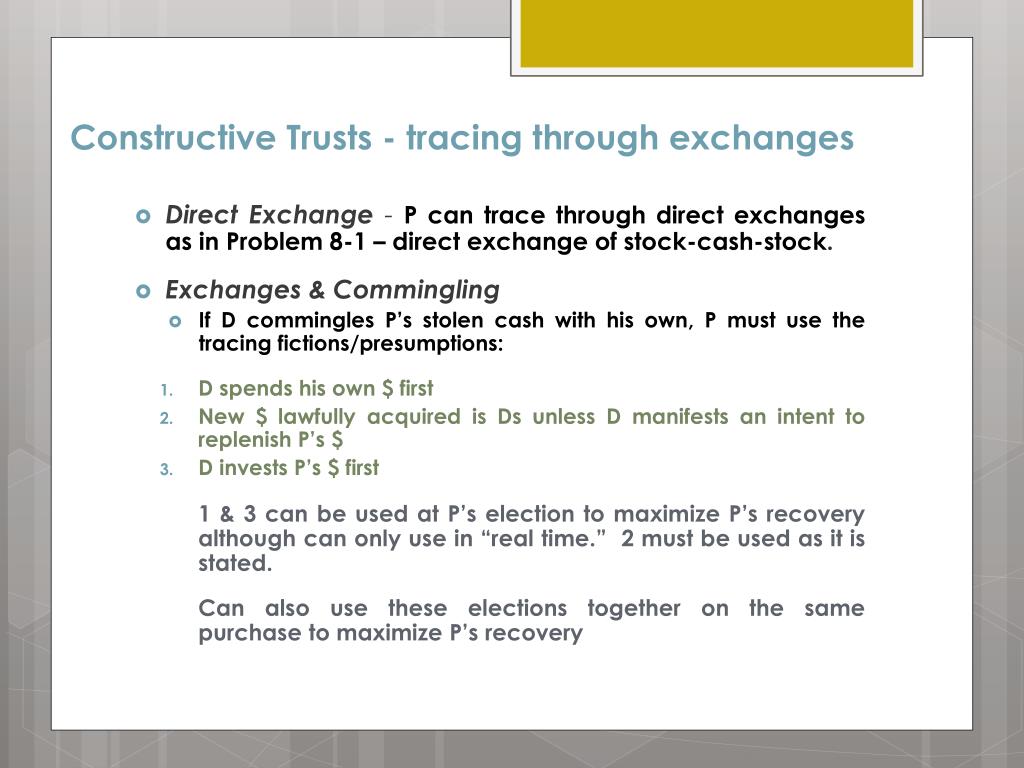Legal Rulings in Determining What Is A Constructive Trust in Property Cases
Wiki Article
Exploring How Does a Constructive Count On Work in Property and Asset Disputes
The idea of a useful trust serves as an important system within home and asset disagreements, resolving scenarios where one celebration has actually unfairly benefited at the expenditure of one more. By checking out the subtleties of just how useful counts on operate, one can uncover the complexities that frequently occur in lawful contexts.
Definition of Constructive Trust
A positive count on develops when a court identifies that it is necessary to protect against unjust enrichment, typically in circumstances where a party has obtained home with wrongful means or under conditions that call for equitable alleviation. This legal treatment is not formally established by the events involved; rather, it is imposed by the court to address circumstances where justness and justice demand intervention.Useful trusts are frequently invoked in situations including fraudulence, violation of fiduciary duty, or other types of misconduct. For example, if an individual wrongfully acquires home that truly comes from an additional, the court might enforce a positive depend make sure that the perpetrator holds the residential property for the advantage of the rightful proprietor. This legal concept operates the concept that it would be inequitable for the wrongdoer to keep the advantages originated from their misbehavior.
Ultimately, a constructive count on serves as a powerful device in residential or commercial property disputes, strengthening the concept that possession need to show not just lawful title however additionally ethical factors to consider. By recognizing the need for equitable alleviation, courts guarantee that justice dominates in the distribution of residential property and assets.
Trick Principles of Positive Counts On
While the application of constructive depends on may differ depending upon specific conditions, a number of vital principles regularly underpin their enforcement in residential or commercial property disagreements. The concept of unfair enrichment plays a pivotal duty; a positive count on is typically imposed to stop one celebration from unjustly profiting at the expense of an additional. This principle highlights the equitable nature of constructive depends on, highlighting that legal possession does not constantly equate to rightful ownership.Secondly, the requirement of a fiduciary partnership is significant. What Is A Constructive Trust. Useful trust funds frequently develop in contexts where one party has a task to act in the most effective interests of another, such as in partnerships or joint endeavors. Violations of this responsibility can trigger the charge of a useful depend protect the aggrieved party's rate of interests
Additionally, the doctrine of objective is essential, as courts consider whether the parties intended to produce a trust-like connection, even if not formally documented. The concept of fair solutions highlights that useful trusts serve to supply alleviation that aligns with fairness and justice, ensuring that the rightful claimant can reclaim residential or commercial property or possessions that they are qualified to, regardless of legal title residing elsewhere.
Applications in Property Disagreements
Useful trusts discover considerable application in home disputes, specifically when dealing with concerns of ownership and equitable legal rights. These trusts arise in circumstances where one event holds home under conditions that, in fairness and justice, should profit one more event. The equitable solution of a constructive depend on avoids unjustified enrichment by recognizing the payments of a party who, despite doing not have official title, has a genuine case to the residential property.One usual scenario includes cohabiting companions who add to the purchase or upkeep of residential or commercial property yet are out the title deed. In such cases, the courts might impose a useful depend mirror the events' purposes and contributions, thereby guaranteeing that the non-titled partner receives a reasonable share of the property.
In addition, constructive counts on can be critical in conflicts including inheritance or family members property, where a decedent's intent may not have been officially documented. Courts may infer a constructive depend honor the decedent's desires and remedy prospective injustices amongst beneficiaries. Overall, useful trust funds work as a vital tool in balancing civil liberties and making certain fair end results in property disagreements, enhancing the concept that justness need to dominate in ownership issues.
Instance Researches and Instances
Residential property conflicts involving constructive read more trusts can frequently be illustrated through real-life study that highlight the intricacies and subtleties of fair legal rights. One noteworthy situation is * Gissing v. Gissing *, where a partner declared an advantageous interest in the household home, saying that her economic contributions during the marriage necessitated a useful trust. The court eventually regulationed in dig this her favor, developing that her payments created a fair interest despite the residential property being only in her hubby's name.Another illustratory instance is * Thompson v. Thompson *, where brother or sisters contested the ownership of a family estate after their moms and dads' passing. One brother or sister had preserved and boosted the home, asserting that these activities warranted a useful trust fund. The court acknowledged the brother or sister's efforts and discovered that a constructive count on was required to stop unfair enrichment, hence awarding them a share in the estate.
These situations exhibit just how useful trusts offer to resolve circumstances where legal ownership does not show truth equitable interests of the events involved, highlighting the relevance of intent and contributions in figuring out rightful insurance claims in residential property disagreements.
Legal Ramifications and Considerations
When resolving positive trust funds in property disputes,Numerous lawful effects and factors to consider develop. Foremost, the establishment of a constructive trust fund commonly depends upon the existence of an unjust enrichment, wherein one event advantages at the expenditure of one more. This principle necessitates a complete evaluation of the connection between the events and the scenarios that caused the supposed inequity.Additionally, courts often call for clear evidence of the claimant's contribution to the home or possession concerned, which can consist of monetary investments, labor, or various other forms of assistance. The problem of proof resides the plaintiff, requiring meticulous documents and statement to substantiate their cases.
Furthermore, the timing of cases is crucial, as laws of restrictions may restrict the capability to establish a positive Extra resources count on after a particular period. Lawful advice has to navigate these time restraints thoroughly to make certain that claims are filed in a prompt fashion.
Finally, the potential for conflicts over the intent behind home transfers can complicate issues even more, requiring a nuanced understanding of both statutory regulation and situation regulation to efficiently support for a customer's interests in positive trust claims.
Verdict

The concept of a useful trust serves as an essential system within home and possession disagreements, addressing situations where one party has actually unjustly profited at the expenditure of an additional. If a specific wrongfully takes possession of home that truly belongs to an additional, the court might enforce a useful trust fund to ensure that the crook holds the property for the benefit of the rightful proprietor.Positive trust funds find substantial application in residential or commercial property disputes, particularly when addressing concerns of possession and equitable rights. Overall, positive counts on offer as a vital tool in harmonizing civil liberties and making certain equitable outcomes in residential property conflicts, enhancing the concept that fairness have to prevail in possession issues.
In recap, constructive trust funds serve as crucial equitable solutions in residential property and property conflicts, resolving unfair enrichment by recognizing the contributions of parties entailed. - What Is A Constructive Trust
Report this wiki page